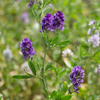Herb of the Week: Alfalfa (Medicago sativa)
September 07, 2019

ALFALFA AT A GLANCE
• Other names: Lucerne, Purple Medick
• Parts used: Leaf, seed
• Taste: Mineral salt, salty
• Energy: Neutral, slightly dry
• Traditional medicinal uses:Anti-inflammatory, antioxidant, diuretic and more
ALFALFA: THE ANCIENT, NATURAL HERBAL ALLY
Nature knows best. Establishing a connection with nature is one of the strongest foundational elements of a lifestyle that allows us to feel our best, and natural herbs and ingredients are an important part of that lifestyle. Thankfully, Alfalfa, or Medicago sativa, is one of the most “natural” herbs you’ll find: the nutrient-rich plant has been grown and used as livestock feed for hundreds of years. In addition to its use as feed, Alfalfa also has a long and storied history as a traditional medicinal herb. When combined with a strong immune system regiment that incorporates elements of a healthy lifestyle, Alfalfa can act as a powerful herbal ally.
TRADITIONAL AND MEDICINAL USES
The following benefits are a combination of medicinal benefits of Alfalfa based on traditional benefits, documented historical uses and modern, scientific examples grounded in studies and research.
• Bone Strengthener
For centuries, Alfalfa has been used as a traditional supplement for weak and brittle bones. Because of its mineral-rich qualities and uses as a livestock-bolstering feed supply, Alfalfa has often been considered a strong supplement to defend against osteoporosis, as well as broken bones. Alfalfa has also traditionally been used to prevent tooth decay (dental caries), strengthen the hair, and provide nutrients that support the nails and skin.
• Anti-Inflammatory
Inflammation is a key contributor to a host of difficult and complex health conditions. When the body experiences inflammation for extended periods of time, the immune system over-protects itself and in doing so attacks itself, often causing painful and debilitating symptoms (many autoimmune disease symptoms are exacerbated by the body’s overreactive inflammation response). Thankfully, Alfalfa’s use as an anti-inflammatory agent has been historically documented for years.
• Antioxidant and Cleanser
The liver, kidneys and other regulatory organs may be the primary “bodily cleansing engines,” but herbal remedies can certainly help bolster the body as it cleanses itself. Such is the case with Alfalfa! Alfalfa has been frequently used as an antioxidant and cleanser, and some believe it can be used in the treatment of Kidney Yin Deficiency. Other hormonal and biological imbalances have been treated using Alfalfa as well.
• Diuretic
While claims of Alfalfa as a diuretic are not scientifically substantiated, Alfalfa has been historically used as a weak diuretic for quite some time. A regulatory herb, Alfalfa is thought to help “flush” the system and cleanse the system – hence its uses as an antioxidant and cleanser as well.
• Neuroprotective
Studies show that Alfalfa acts as a strong neuroprotective substance, strongly supporting the brain and neurological activity. Alfalfa may even combat against mental exhaustion, fatigue and brain fog accompanied by slowed brain activity.
• Nutritional Supplement
When combined with other herbs, Alfalfa can act as a strong nutritional supplement, especially for those who suffer from nutritional deficiencies. Women with low hemoglobin, low folate levels or anemia may also benefit from the nutritive benefits Alfalfa provides.
HERBAL COMBINATIONS
Consult the herbal combinations below to learn which herbal allies can enhance the efficacy of Alfalfa and provide additional benefits that contribute to a natural, holistic, health-oriented lifestyle.
• Bone and Hair Strength Combinations
When combined with Nettle, Horsetail, Oat Straw, Amla, Drynaria and Teasel Root, Alfalfa can defend against osteoporosis, broken bones, dental caries and osteoarthritis. When combined and taken in capsule form, they may also strengthen the hair, nails and skin.
• Nutrition-Boosting Combinations
Combine Alfalfa with Nettles, Ashwagandha, Amla, Spirulina, Chlorella or Barley Green power, to help those experiencing nutritional deficiencies. The combination is thought to be especially effective for women experiencing anemia or menopausal symptoms.
CONTRAINDICATIONS AND DRUG INTERACTIONS
• Can Cause Lupus-Like Conditions In Those With SLE
• Unclean Sprouts Can Cause Food Poisoning
• Vitamin K In Alfalfa Can Inhibit Prescription Drug ‘Warfarin’
No matter its benefits, always be sure to consult any possible contraindications or drug interactions caused by an herbal ally. Alfalfa seeds contain substantial quantities of canavanine, which competes with arginine and can induce a lupus-like condition. Because of this, do not use Alfalfa seeds or sprouts as part of your herbal regiment if you suffer from SLE, as it has been documented to exacerbate the disease. Additionally, while sprouts are easier to consume than seeds, be careful to avoid possible food poisoning from eating sprouts raw. Finally, Alfalfa contains vitamin K, which may interact with the prescription drug Warfarin and inhibit its blood thinning capabilities. Be sure to ingest herbs responsibly and experience their many benefits instead of their possible drawbacks!
WHAT’S NEXT?
Learn more about Alfalfa: find suggested doses, wildcrafting suggestions and more.
Purchase Alfalfa: receive deals from the Embark Herbals store.
Book a one-on-one consultation: consult an expert on how to incorporate herbal allies into your wellness regimen.




